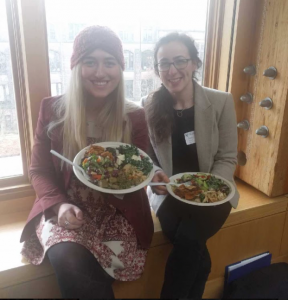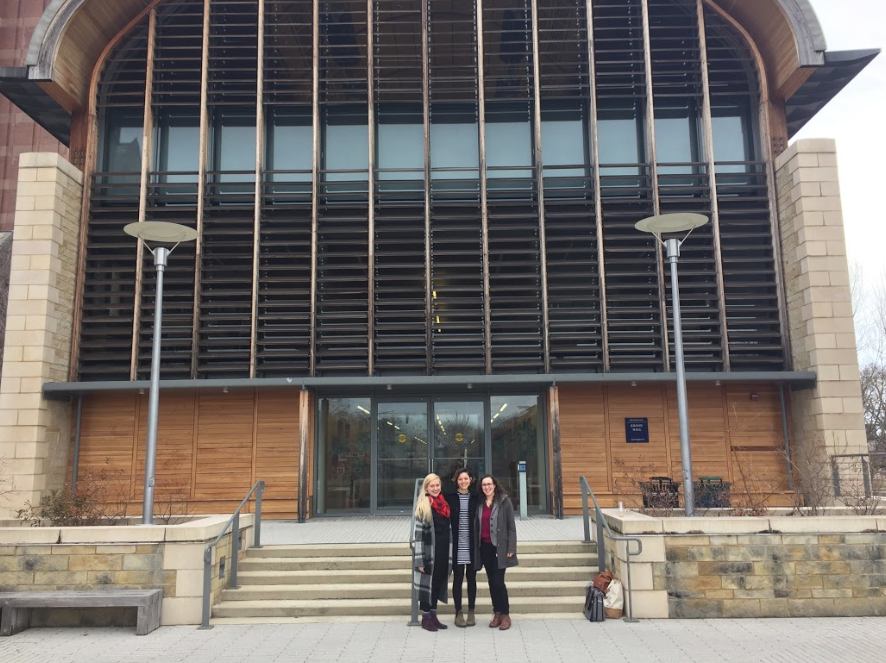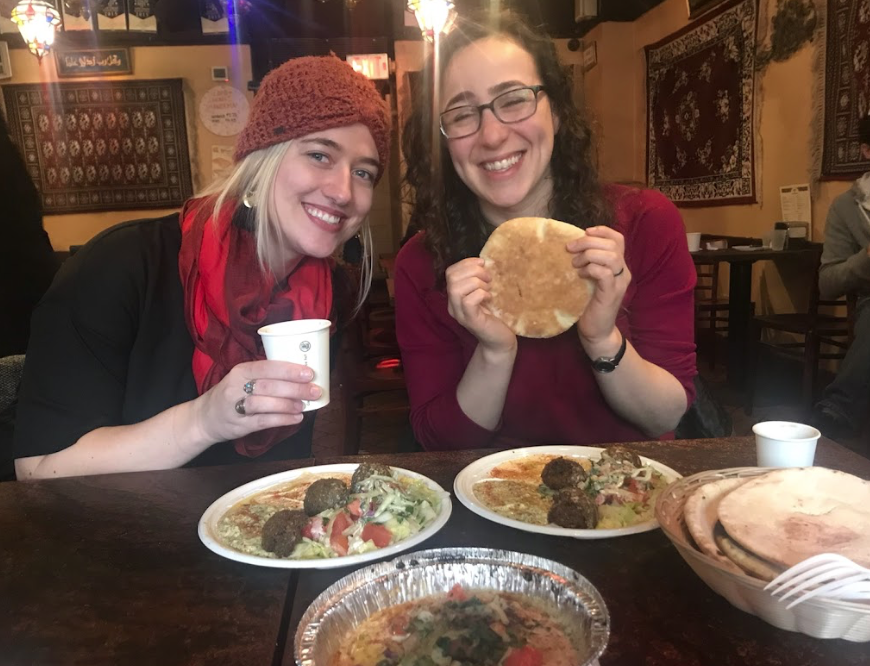By: The FRP Fellows
In late February, the three Food Resiliency Project (FRP) fellows traveled to the 5th annual Yale Food Systems Symposium at Yale University. 3L Sarah Alvarez was invited to present her paper on legal theories in support of food sharing; 2L Alexandria Roullier and 1L Amy Hoover joined her to attend the symposium.

Sarah presented her research at a panel on food recovery . Sarah’s work focuses on the legal theories that support public food sharing, including an emerging “right to food” concept and First Amendment justifications. Sarah explained her work in the context of Food Not Bombs, a group dedicated to sharing free meals as a political protest against the government’s spending on the military as opposed to spending on addressing systemic inequality, poverty, and homelessness. She explained the opportunities, implications, and limitations of First Amendment arguments to combat laws that criminalize food sharing by individuals and non-state sanctioned groups. The First Amendment has proven to be an unwieldy tool in advancing the rights of hungry people and food sharing; not only has it failed to secure change on this front, it presents a confusing legal narrative because free speech and hunger are not necessarily connected. Though the Right to Food is not enshrined in U.S. jurisprudence, it is possible (and Sarah is hopeful) that it can eventually provide more succinct and effective change for food sharers and the hungry.
Sarah’s panel discussed many different issues that arise in a process of moving a food surplus in one area to meet a food need in another area. In the legal sphere, the panel discussed laws that help farmers sell excess crops and laws that limit liability for entities that donate surplus food. From an opposite perspective, Landon Horan (Center for Food Equity & Economic Development at the Council of Churches of Greater Bridgeport) problematized the idea of food recovery as “feeding hungry people,” and instead challenged attendees to turn food surpluses into opportunities to build community wealth and address root causes of poverty.
Throughout the Symposium, FRP fellows attended a wide range of panels and keynotes addressing many different points of interest within food systems. They engaged with law and policy in a panel on the Farm Bill as a tool for systems change. The FRP fellows also examined the intersection of feminist legal theory and copyright law in the context of sourdough starters. The fellows additionally learned about innovative work empowering residents of low-income housing to access food ordering and delivery services.
Saru Jayaraman, Co-Founder and President of the Restaurant Opportunities Centers United (ROC United) delivered a keynote address. Challenging attendees to look beyond typical “food system” issues, Ms. Jayaraman energized attendees to take action to stop the sexual harassment and exploitation of restaurant workers inherent in the tipping system. She stressed a critical connection between overarching ideas of food systems and the lives of the people who grow, prepare, and serve food. Ms. Jayaraman explained how ROC has gained strength by exposing underhanded attacks on the organization and turning those attacks against those who seek to use them. She also emphasized long range planning and centering affected people as leaders of their own organizing efforts. She challenged the crowd of food enthusiasts and activists to use these tools to advance equitable change in their individual focus areas to create change in the broader movement.
Throughout the Symposium, the fellows had interesting conversations and  made new connections with presenters and attendees. The panels and keynotes provoked plans for their own research interests and future directions for the FRP as a whole. The FRP fellows also bonded over local food featured at the conference, shared interests and experiences, and the stressful process of navigating commercial air travel.
made new connections with presenters and attendees. The panels and keynotes provoked plans for their own research interests and future directions for the FRP as a whole. The FRP fellows also bonded over local food featured at the conference, shared interests and experiences, and the stressful process of navigating commercial air travel.
Of course, no food-focused trip to New Haven would be complete without some extracurricular exploration of New Haven’s food scene. The Food Resiliency Project fellows made sure to experience the classics (New Haven Apizza at Frank Pepe and Italian pastries at Lucibello’s) and the more modern favorites (invasive species and plant-based sushi at Miya’s and falafel at Mamoun’s).
With delicious food in their bellies and new knowledge in their heads, the FRP fellows returned to the University of Oregon to keep exploring new frontiers in food and the law with the Food Resiliency Project.
Sarah Alvarez, 3L
Alexandria Roullier, 2L
Amy Hoover, 1L


